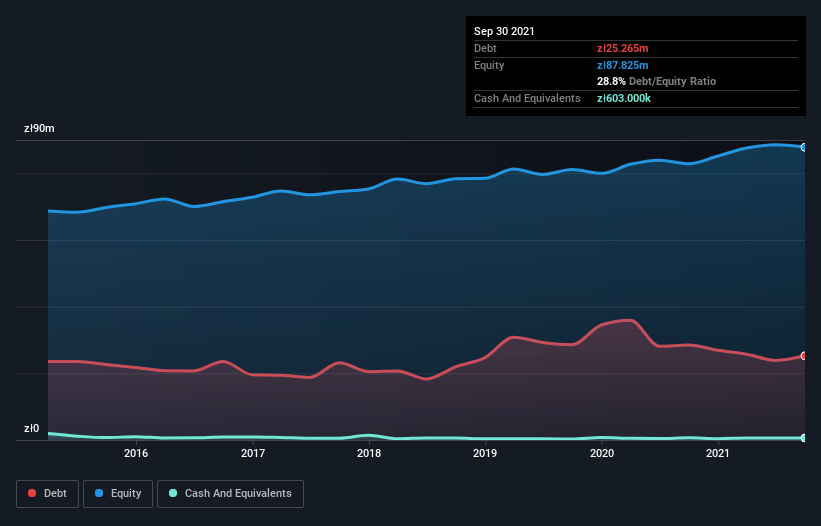
Some say volatility, rather than debt, is the best way to think about risk as an investor, but Warren Buffett famously said that 'Volatility is far from synonymous with risk.' It's only natural to consider a company's balance sheet when you examine how risky it is, since debt is often involved when a business collapses. As with many other companies Makarony Polskie S.A. (WSE:MAK) makes use of debt. But the real question is whether this debt is making the company risky.
When Is Debt A Problem?
Debt is a tool to help businesses grow, but if a business is incapable of paying off its lenders, then it exists at their mercy. Part and parcel of capitalism is the process of 'creative destruction' where failed businesses are mercilessly liquidated by their bankers. While that is not too common, we often do see indebted companies permanently diluting shareholders because lenders force them to raise capital at a distressed price. Of course, debt can be an important tool in businesses, particularly capital heavy businesses. The first thing to do when considering how much debt a business uses is to look at its cash and debt together.
View our latest analysis for Makarony Polskie
What Is Makarony Polskie's Net Debt?
You can click the graphic below for the historical numbers, but it shows that Makarony Polskie had zł25.3m of debt in September 2021, down from zł28.5m, one year before. On the flip side, it has zł603.0k in cash leading to net debt of about zł24.7m.

How Healthy Is Makarony Polskie's Balance Sheet?
According to the last reported balance sheet, Makarony Polskie had liabilities of zł50.6m due within 12 months, and liabilities of zł39.8m due beyond 12 months. Offsetting this, it had zł603.0k in cash and zł22.9m in receivables that were due within 12 months. So it has liabilities totalling zł66.9m more than its cash and near-term receivables, combined.
This is a mountain of leverage relative to its market capitalization of zł79.0m. This suggests shareholders would be heavily diluted if the company needed to shore up its balance sheet in a hurry.
We measure a company's debt load relative to its earnings power by looking at its net debt divided by its earnings before interest, tax, depreciation, and amortization (EBITDA) and by calculating how easily its earnings before interest and tax (EBIT) cover its interest expense (interest cover). The advantage of this approach is that we take into account both the absolute quantum of debt (with net debt to EBITDA) and the actual interest expenses associated with that debt (with its interest cover ratio).
Makarony Polskie has a low net debt to EBITDA ratio of only 1.4. And its EBIT easily covers its interest expense, being 77.5 times the size. So we're pretty relaxed about its super-conservative use of debt. In addition to that, we're happy to report that Makarony Polskie has boosted its EBIT by 38%, thus reducing the spectre of future debt repayments. The balance sheet is clearly the area to focus on when you are analysing debt. But it is Makarony Polskie's earnings that will influence how the balance sheet holds up in the future. So if you're keen to discover more about its earnings, it might be worth checking out this graph of its long term earnings trend.
Finally, while the tax-man may adore accounting profits, lenders only accept cold hard cash. So we always check how much of that EBIT is translated into free cash flow. Over the last three years, Makarony Polskie saw substantial negative free cash flow, in total. While that may be a result of expenditure for growth, it does make the debt far more risky.
Our View
We feel some trepidation about Makarony Polskie's difficulty conversion of EBIT to free cash flow, but we've got positives to focus on, too. To wit both its interest cover and EBIT growth rate were encouraging signs. Looking at all the angles mentioned above, it does seem to us that Makarony Polskie is a somewhat risky investment as a result of its debt. Not all risk is bad, as it can boost share price returns if it pays off, but this debt risk is worth keeping in mind. When analysing debt levels, the balance sheet is the obvious place to start. But ultimately, every company can contain risks that exist outside of the balance sheet. Be aware that Makarony Polskie is showing 2 warning signs in our investment analysis , you should know about...
If, after all that, you're more interested in a fast growing company with a rock-solid balance sheet, then check out our list of net cash growth stocks without delay.
New: Manage All Your Stock Portfolios in One Place
We've created the ultimate portfolio companion for stock investors, and it's free.
• Connect an unlimited number of Portfolios and see your total in one currency
• Be alerted to new Warning Signs or Risks via email or mobile
• Track the Fair Value of your stocks
Have feedback on this article? Concerned about the content? Get in touch with us directly. Alternatively, email editorial-team (at) simplywallst.com.
This article by Simply Wall St is general in nature. We provide commentary based on historical data and analyst forecasts only using an unbiased methodology and our articles are not intended to be financial advice. It does not constitute a recommendation to buy or sell any stock, and does not take account of your objectives, or your financial situation. We aim to bring you long-term focused analysis driven by fundamental data. Note that our analysis may not factor in the latest price-sensitive company announcements or qualitative material. Simply Wall St has no position in any stocks mentioned.
About WSE:MAK
Makarony Polskie
Engages in the manufacture and sale of pastas for various consumers in Poland.
Flawless balance sheet, good value and pays a dividend.
Market Insights
Community Narratives



